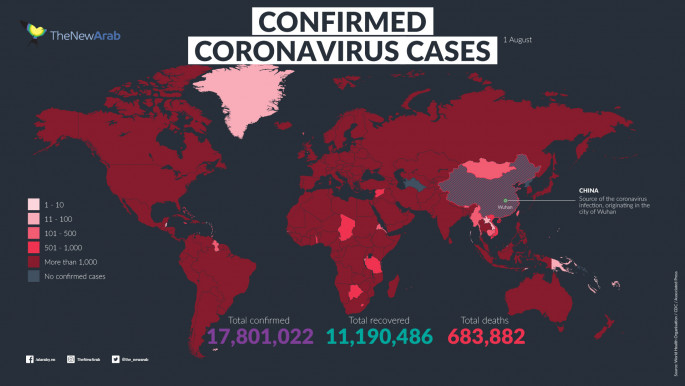Follow us on Facebook, Twitter and Instagram to stay connected
The Middle East at war with coronavirus: Top stories from 16 March
Here are five takeaways about coronavirus in the Middle East this Monday.
Lebanon, Kuwait and Iraq in lockdown
Baghdad, Kuwait City and Beirut were in lockdown on Monday, with an eerie quiet descending on the usually bustling streets of the three major Arab capitals.
Saudi Arabia has also ordered a semi-shutdown of the country with public sector workers ordered home and malls closed, except for pharmacies and food stores.
Lebanon has announced a nationwide shutdown with borders, airports and ports closing from 18 and 19 March.
Private sector employees have also been told to work from home in a bid to stop the spread of the virus, after 109 cases were recorded.
"Each of us is called upon to continue his work, from home, in the way he sees appropriate," President Michel Aoun said on Sunday.
Iraq, which has seen 110 cases of the virus and 10 deaths, announced a curfew on Sunday covering the capital.
Baghdad airport will suspend flights between 17 and 24 March, the government said on Sunday.
There are concerns about the spread of coronavirus from neighbouring Iran, which has become a global epicentre of the disease.
Kurdish regions have also announced lockdowns due to the corona threat.
Bahraini woman becomes GCC’s first coronavirus death
A Bahraini woman was announced as the first person in the GCC region to die from COVID-19, after more than 1,000 cases were confirmed in the Gulf region.
Bahrain's health ministry said on Twitter that the 65-year-old woman had pre-existing medical conditions and passed away on Monday.
|
|
She had been in quarantine after contracting the disease in Iran, Anadolu Agency reported.
All but one of the 214 active cases in Bahrain is in a stable condition, health authorities said.
Gulf states - including Bahrain - have announced stringent measures to control the spread of COVID-19, including closing borders and banning public events.
More than 6,500 people have died from the disease worldwide, which is believed to have originated in Wuhan, China.
Oman to fine cafes $2,600 for selling shisha
Omani authorities will fine any establishment caught selling shisha – also known as hookah or nargila – a 1,000 rial fine ($2,560) fine, Muscat Municipality announced Monday.
Shisha lounges across the Gulf region have been closed to contain the spread of coronavirus, where there has been 1,000 cases of COVID-19 - most of them linked to Iran.
The novel coronavirus Sars-Cov-2, which causes the disease COVID-19, is highly contagious and spread person-to-person via respiratory droplets in the air or on surfaces.
Shisha is a popular way of consuming tobacco in the Middle East and also a social activity but health authorities consider a way of spreading the disease.
This is due to the number of people who gather in shisha cafes to smoke and pipes sometimes being shared among friends.
Oman, the UAE, Kuwait and Saudi Arabia have banned shisha cafes, issuing tough fines for transgressors.
 |
"After inspecting 69 cafes and restaurants which offer hookah, Muscat Municipality appreciates the commitment of these establishments in their preventive measures to combat the COVID-19 outbreak," Muscat Municipality said in a statement.
Egypt to ban all flights as country goes into a 'deep clean' stage
Egypt's Prime Minister Mostafa Madbouly said that he was halting all flights to-and-from the country from Thursday in efforts to battle coronavirus, Al Jazeera reported on Monday.
The flight ban would be in place until 31 March and the nearly two-week window would allow for a deep clean of hotels across the country. Tourists currently in Egypt would be able to complete their holidays, he said.
Madbouly urged Egyptians not to stockpile essential goods saying that the country has enough supplies to last for months.
Tourism is a key industry in Egypt and closing the country to foreigners will likely have deep economic ramifications for the economy.
There are officially 126 cases of coronavirus in the country, many of them contracted onboard Nile cruise ships.
At least 97 people who have visited Egypt in recent months are thought to have tested positive with the disease on their return home.
Yet the true figure of corona cases is feared to be much higher, with talk of a cover-up by authorities - something firmly denied by Cairo.
A University of Toronto study has suggested that more than 19,000 people could have the disease, according to The Guardian.
|
|
"Under the conservative estimate of COVID-2019 burden, where linked and ambiguous cases are eliminated, we estimated an outbreak size of 19,310 cases in Egypt," the researchers said.
"Egypt likely has a large burden of COVID-2019 cases that are unreported and greater public health clinical capacity may help identify and manage cases."
Bail out plans
Gulf states announced stimulus measures and bail-out packages to help businesses battered by tough coronavirus containment measures to cope in the coming months.
The UAE on Monday revealed measures to tackle the economic crisis caused by the coronavirus crisis and low oil prices, which includes a 3 billion dirham ($800 million) credit guarantee for SMEs.
Abu Dhabi also announced further subsidies for citizens and businesses and reduced or cancelled a number of government fees in a bid to stimulate growth.
Qatar also announced a 75 billion riyal ($20 billion) stimulus package to help weather the coronavirus crisis plus an injection of 10 billion rials ($2.7 billion) into the capital market.
Businesses in the retail, hospitality, tourism and logistics sectors will also be exempted from water and electricity bills for the next six months.
Oil prices dropped further on Monday, dipping below the $30 a barrel mark in some markets.
A massive drop in retail and tourism is also likely to impact negatively on Gulf economies, but the countries have been generally viewed as having, for now, the public health crisis under control.



